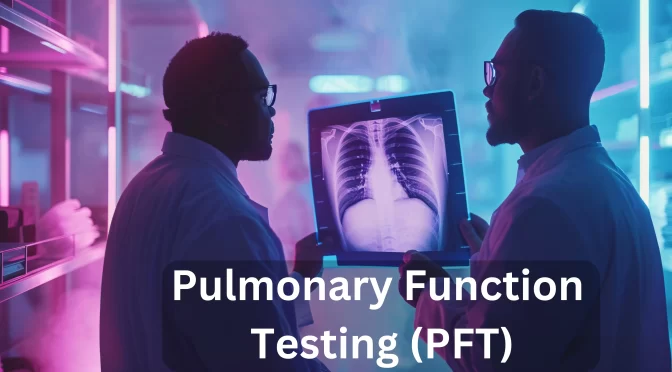1. Introduction
Lung health is often overlooked, yet it is essential for overall well-being. The lungs play a critical role in delivering oxygen to the body and removing carbon dioxide. When lung function deteriorates, it affects every aspect of life, from daily activities to overall health. Pulmonary Function Testing (PFT) is a vital tool used by medical professionals to assess lung performance, detect diseases early, and monitor lung health over time. This blog explores the importance of PFT, the types of tests involved, and how it can help in diagnosing and managing lung conditions.
2. What is Pulmonary Function Testing (PFT)?
Pulmonary Function Testing refers to a set of non-invasive tests that measure how well the lungs are working. It assesses the airflow, lung volumes, and the lungs’ ability to exchange gases efficiently. These tests are used to diagnose respiratory conditions, monitor disease progression, and guide treatment. PFT is crucial in evaluating lung diseases like asthma, Chronic Obstructive Pulmonary Disease (COPD), and pulmonary fibrosis.
3. Why is Pulmonary Function Testing Important?
Pulmonary Function Testing provides essential data about the health of the lungs. It helps in:
- Early Diagnosis: Detecting lung diseases such as asthma, COPD, or pulmonary fibrosis in their early stages.
- Monitoring Progress: Tracking the progression of lung diseases and adjusting treatments accordingly.
- Surgical Preparation: Assessing lung function before surgeries, particularly for lung or heart operations.
- Occupational Health: Evaluating lung function in people exposed to workplace hazards, such as dust, fumes, or chemicals.
4. Types of Pulmonary Function Tests
There are several types of tests used to evaluate different aspects of lung function:
a. Spirometry
Spirometry measures how much air you can breathe in and out, and how fast you can blow air out of your lungs. This test is critical in diagnosing obstructive lung conditions like asthma and COPD.
b. Lung Volume Tests
Lung volume tests measure the total amount of air the lungs can hold and the volume of air left after exhalation. These tests are used to detect restrictive lung diseases where the lungs cannot expand fully, such as pulmonary fibrosis.
c. Diffusion Capacity Test (DLCO)
This test evaluates how well oxygen and other gases move from the lungs into the bloodstream. A reduced diffusion capacity can indicate diseases like emphysema or pulmonary hypertension.
5. Who Should Consider Pulmonary Function Testing?
PFT is recommended for individuals showing symptoms of respiratory issues, such as chronic cough, shortness of breath, or wheezing. People with existing lung diseases like asthma, COPD, or interstitial lung disease should also undergo regular PFTs to monitor their condition. Additionally, smokers, people exposed to toxic substances, and individuals with a history of lung diseases should consider getting tested.
6. Preparing for a Pulmonary Function Test
Before undergoing PFT, it’s important to follow certain guidelines to ensure accurate results:
- Avoid heavy meals: A full stomach can interfere with lung function measurements.
- Refrain from smoking: Smoking before the test can skew the results.
- Stop certain medications: Your doctor may advise you to stop taking bronchodilators or other lung medications before the test.
- Wear comfortable clothing: Restrictive clothing can affect breathing.
7. What Happens During a Pulmonary Function Test?
A typical PFT involves sitting in a chair and breathing into a mouthpiece connected to a machine. The test is usually painless and takes 30-60 minutes to complete. During spirometry, you’ll be asked to take a deep breath and blow out as hard and fast as possible into the machine. Other tests, like lung volume measurement, may require sitting in a small booth (plethysmograph) while breathing through the mouthpiece.
8. Understanding Pulmonary Function Test Results
PFT results are typically shown as percentages, comparing your lung function to what is expected for someone of your age, height, and gender. Key metrics include:
- Forced Expiratory Volume (FEV1): The amount of air you can exhale in one second. Lower values may indicate obstructive conditions like asthma or COPD.
- Forced Vital Capacity (FVC): The total amount of air exhaled after a deep breath. A reduced FVC may suggest restrictive lung diseases.
- Total Lung Capacity (TLC): The total amount of air your lungs can hold.
- Diffusion Capacity (DLCO): A lower value suggests poor gas exchange in the lungs, possibly due to conditions like emphysema or pulmonary hypertension.
9. Common Lung Conditions Diagnosed with PFT
Pulmonary Function Tests are instrumental in diagnosing several lung conditions:
- Asthma: Characterized by inflamed airways, PFT helps monitor airway restriction.
- Chronic Obstructive Pulmonary Disease (COPD): A progressive condition that reduces airflow and is commonly diagnosed and monitored using spirometry.
- Pulmonary Fibrosis: A lung condition where lung tissue becomes scarred, reducing lung capacity. PFT helps identify reduced lung volumes in such cases.
10. Risks and Limitations of Pulmonary Function Testing
PFT is generally safe, with minimal risks. Some patients may experience slight dizziness or shortness of breath during the test, but these symptoms typically subside quickly. The results may be inaccurate if patients are unable to follow instructions properly or if they are too fatigued during the test. Furthermore, PFT may not detect very mild or early-stage conditions.
11. Pulmonary Function Testing at Apex Pulmonology
At Apex Pulmonology – best pulmonologist in kochi, we offer state-of-the-art Pulmonary Function Testing services to diagnose and monitor a wide range of respiratory conditions. Our team of specialists ensures that patients receive the most accurate test results in a comfortable and safe environment. By prioritizing lung health, we help patients catch potential issues early and manage existing conditions effectively.
12. Conclusion
Pulmonary Function Testing is a crucial tool for maintaining lung health. Whether you’re experiencing symptoms of a lung condition or monitoring an existing disease, PFT provides valuable insights into how well your lungs are functioning. At Apex Pulmonology, our expert team is here to support you with comprehensive testing and personalized care. Schedule your PFT today and take control of your respiratory health.

